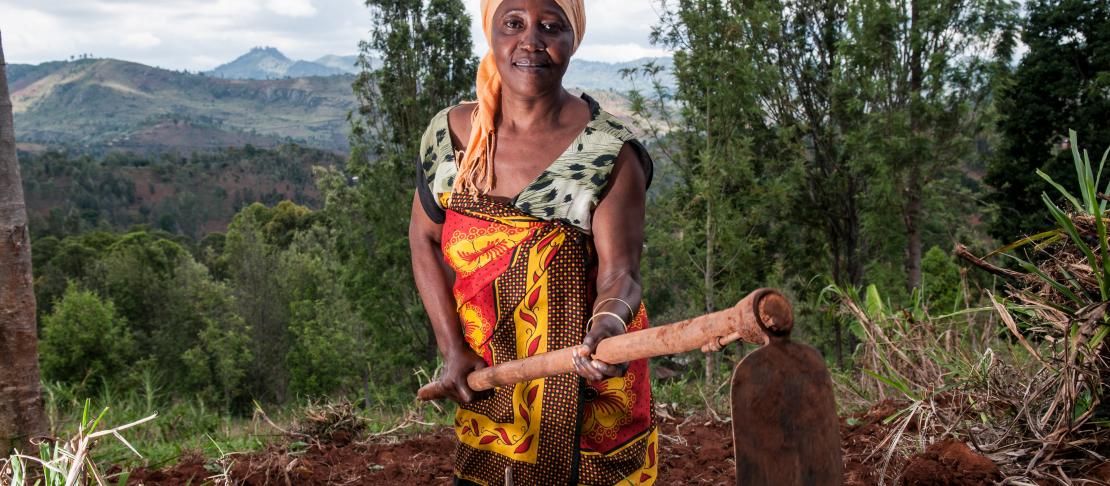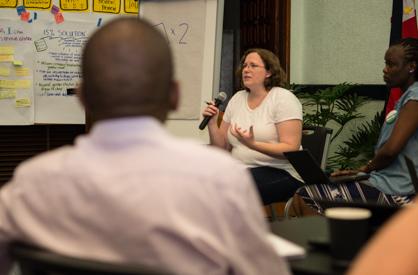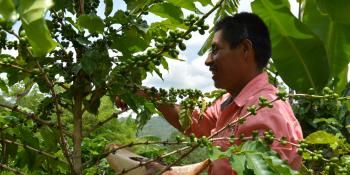Women on the front line battling climate change

How can we reduce gender gaps within the communities in smallholder agriculture?
Climate change has serious implications for food security. Chaotic weather patterns and more intense droughts or flooding events are impacting food availability and production in ways that farmers cannot predict.
If you want to know more about research on closing the gender gap in farming under climate change:
- read our special blog series on Closing the gender gap
- watch the presentations and the panel discussion from the Closing the gender gap event
- follow the #AgGenderGap event hashtag on twitter
In this context, food and water sources become more unpredictable and scarce, and women face loss of income, harvest, and increased labor amid rising food prices. Because women are often excluded from decision-making regarding access to and use of land and resources, ensuring that women have more equitable access to and control over resources and are able to participate in decision-making processes is vital.
“Women in many farming communities are responsible for staple food production that nourishes the family,” said Peter Läderach, Climate Change theme leader in CIAT’s Decision and Policy Analysis Research Area. “With increasing population and climatic challenges, this task will become even more important and difficult. That’s why a special focus on gender in agriculture and Natural Resource Management is of critical importance."
At the Gender and Agriculture Research Network Annual Meeting in the Philippines last week, Jennifer Twyman, an agricultural economist at CIAT, made the case that with increased pressure from climate change, it is more important than ever to ensure that women benefit more equally from their investments in agricultural production.
Interview with Jennifer Twyman: why women need more control over resources
 Jennifer Twyman explains gender issues in agriculture. Photo: Georgina Smith (CIAT)
Jennifer Twyman explains gender issues in agriculture. Photo: Georgina Smith (CIAT)
"Climate change is an issue which cuts across assets, land issues, water resources. It impacts the typical agricultural calendar, so decisions about when to plant or when to harvest are thrown up in the air. Workloads often increase - the common example is women carrying water. With water resources dwindling, women and sometimes men, have to go further to collect water.
In general, access to resources is a big indicator of empowerment, and this issue has not fully been addressed in terms of climate change implications. In Ecuador, for example we have worked in communities where men migrate as a result of negative climate impacts on their farm production. Although the women in this case are technically left in control of land assets, they don’t always have complete control over the land they manage: many women still consult their husbands on a regular basis about what to grow and when.
This shows how women, who are doing most of the work, are still not empowered to make farm management decisions. Although some women become more empowered because they are left in control of land, in some households the power dynamics don’t change. In fact, women’s workloads may increase because they are now tasked with all production activities in the absence of their husbands – yet the husbands are still making the decisions.
The balance of power
In this respect, gender norms are dynamic; they change and can be influenced positively or negatively by factors including climate change. For example, with more intense weather patterns, increased pests and diseases are more of a problem, and men tend to have better access to pesticides. If women don’t have access to pesticides or other agricultural necessities like fertilizers, their ability to increase production is already limited.
Just making men and women more aware of their different roles and responsibilities is a step forward. We work in a context – smallholder agriculture – where men are not always empowered either. That is why our overall aim is to increase the empowerment of both men and women: to reduce empowerment gaps within communities generally in agriculture.
There have been times when we’ve been asked not to talk about gender in communities because it causes tension. In those cases, we talk about roles of different family members instead, which involves looking at the relationships between both men and women, and prompting community members to really think about the different tasks they are doing.
For example, we can use frameworks to show that increasing the power of one person does not always have to result in diminishing the power of anyone else. This is about creating win-win situations, where increasing women’s power doesn’t need to decrease men’s power.
Thinking ahead
Ultimately, our goal is to provide information and tools which strengthen the resilience of whole communities. When it comes to adaptation planning for example, collective action has real advantages. Both women and men work towards solutions and plan for adaptation together, otherwise tensions are created.
We’ve been working with communities particularly in Latin America in a very participatory way, identifying typical agricultural calendars throughout the year, then discussing recent drought or flooding periods - and prompting communities to think about the implications of those events for both men and women. Which groups are responsible for which tasks; ensuring more equitable processes are in place if emergencies hit again.
We are working towards scaling out community-driven responses with local ministries and government bodies which can partner and support these efforts. We are trying to get communities at the decision making table – it hasn’t happen everywhere yet, but this is what we are working towards."
Jennifer Twyman focuses on gender within the CGIAR’s Research Program on Climate Change, Agriculture, and Food Security. She is based at the International Center for Tropical Agriculture’s headquarters in Colombia.
Georgina Smith is a Communications Specialist working for International Center for Tropical Agriculture (CIAT) based in Vietnam. She also helps with communication for CCAFS in the Southeast Asia region.



